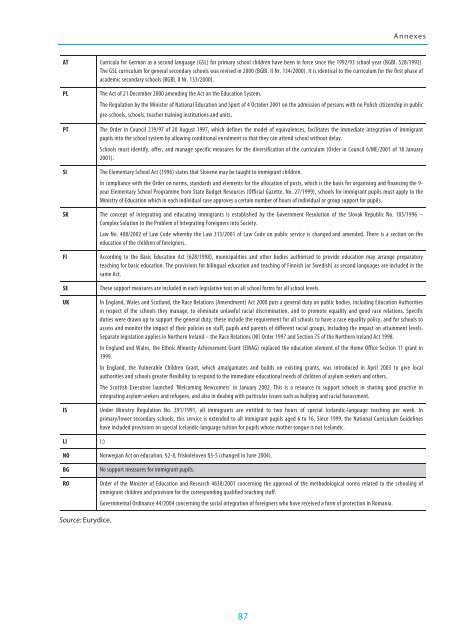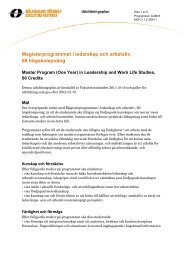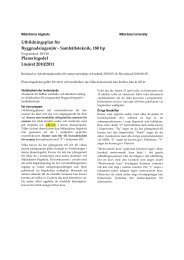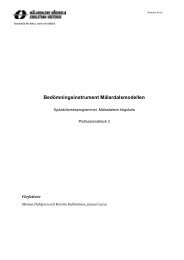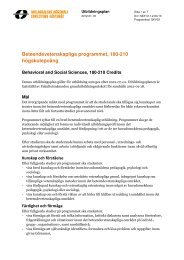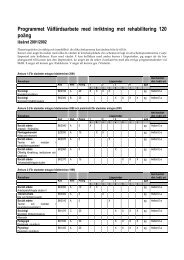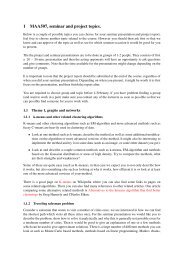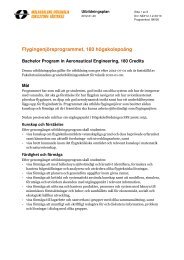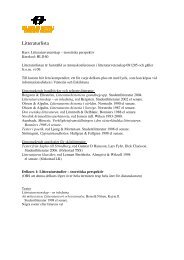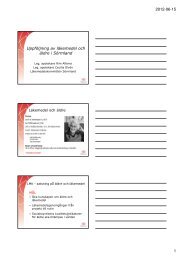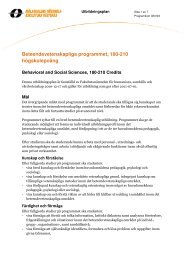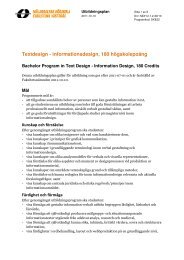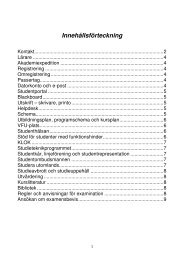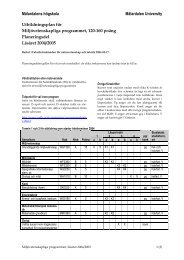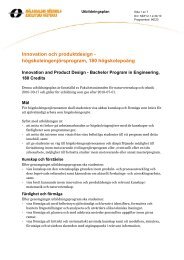Integrating Immigrant Children into Schools in Europe
Integrating Immigrant Children into Schools in Europe
Integrating Immigrant Children into Schools in Europe
You also want an ePaper? Increase the reach of your titles
YUMPU automatically turns print PDFs into web optimized ePapers that Google loves.
AnnexesAT Curricula for German as a second language (GSL) for primary school children have been <strong>in</strong> force s<strong>in</strong>ce the 1992/93 school year (BGBl. 528/1992).The GSL curriculum for general secondary schools was revised <strong>in</strong> 2000 (BGBl. II Nr. 134/2000). It is identical to the curriculum for the first phase ofacademic secondary schools (BGBl. II Nr. 133/2000).PLPTSIThe Act of 21 December 2000 amend<strong>in</strong>g the Act on the Education System.The Regulation by the M<strong>in</strong>ister of National Education and Sport of 4 October 2001 on the admission of persons with no Polish citizenship <strong>in</strong> publicpre-schools, schools, teacher tra<strong>in</strong><strong>in</strong>g <strong>in</strong>stitutions and units.The Order <strong>in</strong> Council 219/97 of 20 August 1997, which def<strong>in</strong>es the model of equivalences, facilitates the immediate <strong>in</strong>tegration of immigrantpupils <strong><strong>in</strong>to</strong> the school system by allow<strong>in</strong>g conditional enrolment so that they can attend school without delay.<strong>Schools</strong> must identify, offer, and manage specific measures for the diversification of the curriculum (Order <strong>in</strong> Council 6/ME/2001 of 18 January2001).The Elementary School Act (1996) states that Slovene may be taught to immigrant children.In compliance with the Order on norms, standards and elements for the allocation of posts, which is the basis for organis<strong>in</strong>g and f<strong>in</strong>anc<strong>in</strong>g the 9-year Elementary School Programme from State Budget Resources (Official Gazette, No. 27/1999), schools for immigrant pupils must apply to theM<strong>in</strong>istry of Education which <strong>in</strong> each <strong>in</strong>dividual case approves a certa<strong>in</strong> number of hours of <strong>in</strong>dividual or group support for pupils.SK The concept of <strong>in</strong>tegrat<strong>in</strong>g and educat<strong>in</strong>g immigrants is established by the Government Resolution of the Slovak Republic No. 105/1996 –Complex Solution to the Problem of <strong>Integrat<strong>in</strong>g</strong> Foreigners <strong><strong>in</strong>to</strong> Society.Law No. 408/2002 of Law Code whereby the Law 313/2001 of Law Code on public service is changed and amended. There is a section on theeducation of the children of foreigners.FISEUKISAccord<strong>in</strong>g to the Basic Education Act (628/1998), municipalities and other bodies authorised to provide education may arrange preparatoryteach<strong>in</strong>g for basic education. The provisions for bil<strong>in</strong>gual education and teach<strong>in</strong>g of F<strong>in</strong>nish (or Swedish) as second languages are <strong>in</strong>cluded <strong>in</strong> thesame Act.These support measures are <strong>in</strong>cluded <strong>in</strong> each legislative text on all school forms for all school levels.In England, Wales and Scotland, the Race Relations (Amendment) Act 2000 puts a general duty on public bodies, <strong>in</strong>clud<strong>in</strong>g Education Authorities<strong>in</strong> respect of the schools they manage, to elim<strong>in</strong>ate unlawful racial discrim<strong>in</strong>ation, and to promote equality and good race relations. Specificduties were drawn up to support the general duty; these <strong>in</strong>clude the requirement for all schools to have a race equality policy, and for schools toassess and monitor the impact of their policies on staff, pupils and parents of different racial groups, <strong>in</strong>clud<strong>in</strong>g the impact on atta<strong>in</strong>ment levels.Separate legislation applies <strong>in</strong> Northern Ireland – the Race Relations (NI) Order 1997 and Section 75 of the Northern Ireland Act 1998.In England and Wales, the Ethnic M<strong>in</strong>ority Achievement Grant (EMAG) replaced the education element of the Home Office Section 11 grant <strong>in</strong>1999.In England, the Vulnerable <strong>Children</strong> Grant, which amalgamates and builds on exist<strong>in</strong>g grants, was <strong>in</strong>troduced <strong>in</strong> April 2003 to give localauthorities and schools greater flexibility to respond to the immediate educational needs of children of asylum seekers and others.The Scottish Executive launched ‘Welcom<strong>in</strong>g Newcomers’ <strong>in</strong> January 2002. This is a resource to support schools <strong>in</strong> shar<strong>in</strong>g good practice <strong>in</strong><strong>in</strong>tegrat<strong>in</strong>g asylum seekers and refugees, and also <strong>in</strong> deal<strong>in</strong>g with particular issues such as bully<strong>in</strong>g and racial harassment.Under M<strong>in</strong>istry Regulation No. 391/1991, all immigrants are entitled to two hours of special Icelandic-language teach<strong>in</strong>g per week. Inprimary/lower secondary schools, this service is extended to all immigrant pupils aged 6 to 16. S<strong>in</strong>ce 1999, the National Curriculum Guidel<strong>in</strong>eshave <strong>in</strong>cluded provisions on special Icelandic-language tuition for pupils whose mother tongue is not Icelandic.LI (:)NO Norwegian Act on education, §2-8, friskoleloven §3-5 (changed <strong>in</strong> June 2004).BGRONo support measures for immigrant pupils.Order of the M<strong>in</strong>ister of Education and Research 4638/2001 concern<strong>in</strong>g the approval of the methodological norms related to the school<strong>in</strong>g ofimmigrant children and provision for the correspond<strong>in</strong>g qualified teach<strong>in</strong>g staff.Governmental Ord<strong>in</strong>ance 44/2004 concern<strong>in</strong>g the social <strong>in</strong>tegration of foreigners who have received a form of protection <strong>in</strong> Romania.Source: Eurydice.87


